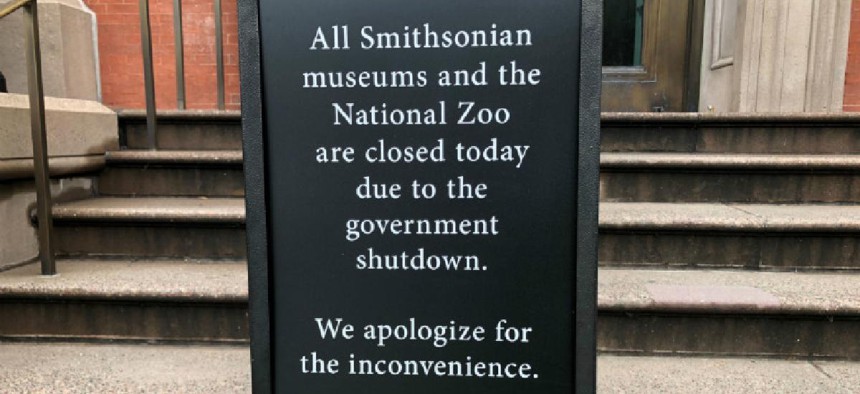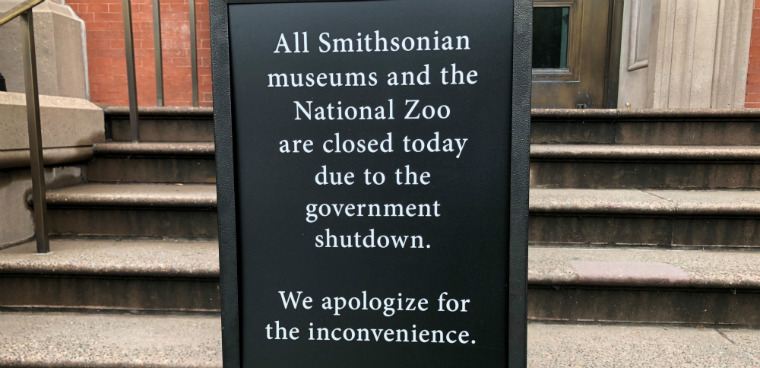Shutdown entering uncharted waters, with impacts on 2020 budgeting

Furloughs and unpaid work have "a rotting effect on morale," said one former agency CFO. "That is an overarching concern in reopening after a shutdown of significant length – and I think we're at that point now."

A sign outside the Smithsonian's Renwick Gallery, across the street from the Office of Management and Budget. (Photo credit: Adam Mazmanian/FCW)
Feds are getting a lot of practice at closing up the government, and to some extent they know the drill, according to two veterans of previous shutdowns. However, the current shutdown is drifting into uncharted waters, with agencies having to reconsider their shutdown plans. Additionally, reopening government agencies after a shutdown and picking up required activity from a full stop carries its own set of costs.
After the 16-day shutdown in 2013, officials at the Office of Management and Budget put together a set of procedures for dealing with lapses in appropriations, including requiring shutdown plans from agencies.
Dave Mader, formerly acting deputy director for management at OMB, said he was "struck with how organized his agency was" when it came to executing shutdowns.
"We went through the drill two or three times in my tenure there. What I was pleased with was the fact that they had built a repeatable process. Agencies weren't making things up as they went along," said Mader, who now works at Deloitte as civilian sector chief strategy officer in the firm's government and public services practice.
But OMB's orderly plans are designed for brief shutdowns. If the current partial shutdown endures past a few weeks, agencies are going to have to reconsider their priorities, Mader said.
"There's things you can do if it's going to last a day or two," he said. As a shutdown lingers, Mader said "you need to revisit the decisions you make ... it's a constant re-examination of the critical aspects of your mission and how many people you need to perform those critical missions."
The shutdown also impacts workers as they return from furlough.
"Work is piling up, and that backlog needs to be addressed when the government reopens," said Doug Criscitello, formerly chief financial officer of the Department of Housing and Urban Development and current executive director of the Center for Finance and Policy at the Massachusetts Institute of Technology. "But it's not as if workers are coming back from vacation -- tanned rested and with their batteries recharged. They're coming back from a break, full of anxiety, where their professional value has been called into question by the elected leaders they're intended to serve."
The overall experience has a "rotting effect on morale," Criscitello said. "That is an overarching concern in reopening after a shutdown of significant length -- and I think we're at that point now."
Undermining 2020
Another big concern for the future is the president's 2020 budget submission, which is due in the first week of February and almost guaranteed to be late at this point, with much of OMB's career staff on furlough.
A late budget submission isn't extraordinary, but a prolonged delay has an impact on future plans said Criscitello, who served in a career post at OMB and worked on many budgets.
"The nitty-gritty budgetary calculations of what it takes to operate agencies [produced by OMB] is really the starting point" for budget negotiations, Criscitello said. "Even if the House and Senate develop their own budget proposals, their starting point is the financial information provided by OMB. Without that, you can't really get started in an informed way," he said.
"The already dysfunctional budget process will break down just as its getting started. Not only did the 2019 process fail but we may be undermining the 2020 process," Criscitello said.
Mader pointed out that there's unfinished business at OMB for 2019 funding, with the passage into law of seven appropriations needed to end the current standoff.
"Once there's a resolution for this, then the OMB budget examiners are going to have to kick into high gear and do apportionment for the agencies for 2019, because we're three months into the current fiscal year," Mader said.
The shuttered agencies will also face problems getting their contractor workforces and procurement activities restarted.
"It's not as simple as a light switch to get everything going again," Criscitello said.
NEXT STORY: SEWP still selling through the shutdown



